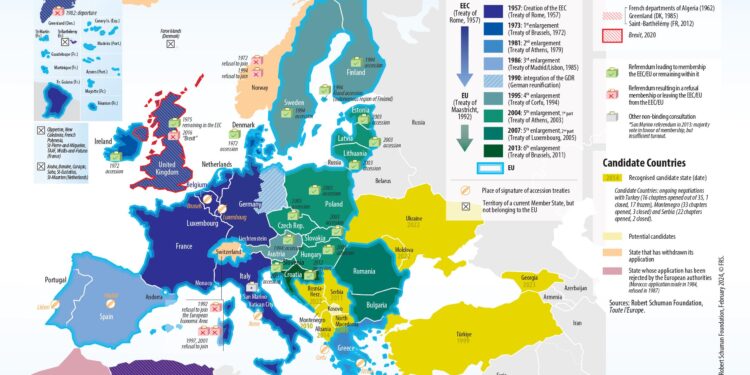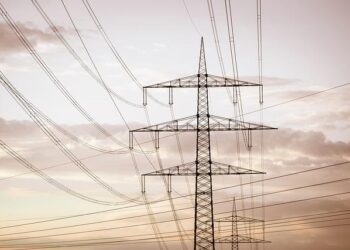The European Union has signaled its reluctance to pursue a difficult and potentially divisive decoupling of Ukraine and Moldova’s accession bids, amid growing geopolitical tensions and complex EU enlargement dynamics. As Kyiv and Chi»ôinńÉu both push for swift integration into the bloc, Brussels faces a delicate balancing act in managing their closely linked ambitions while addressing diverse political and economic challenges. This developing stance underscores the EU’s cautious approach to enlargement amid ongoing regional instability.
EU Faces Challenges in Managing Ukraine and Moldova Accession Processes
The European Union is navigating a complex landscape as it seeks to integrate both Ukraine and Moldova into its fold. Official sources highlight the difficulty of fully decoupling the accession trajectories of these neighboring countries, given their intertwined political and economic realities. While Brussels aims to maintain a coordinated approach to enlargement, divergent domestic reforms and geopolitical pressures create hurdles that risk stalling progress. Decision-makers face balancing act challenges – ensuring equitable treatment without letting one process overshadow or unduly delay the other.
Key challenges in the accession processes include:
- Varying pace of judicial and anti-corruption reforms
- Balancing EU security concerns amid ongoing regional instability
- Addressing economic disparities and aligning regulatory frameworks
- Managing public opinion and political dynamics within existing member states
| Country | Judicial Reform Status | Integration Progress |
|---|---|---|
| Ukraine | Ongoing but inconsistent | Moderate |
| Moldova | Slower, with political setbacks | Nascent |
Implications of Decoupling Accession Bids on Regional Stability and Integration
The prospect of separating Ukraine and Moldova’s EU accession bids poses significant risks to the region’s geopolitical equilibrium. Analysts warn that decoupling the processes could inadvertently fuel divisions among Eastern European neighbors, hindering collective bargaining power and delaying reforms essential for integration. Ukraine’s pivotal role as a buffer between the EU and Russia means any perceived inequality in accession treatment might exacerbate tensions, potentially empowering external actors seeking to undermine regional unity. Maintaining synchronized accession timelines is seen as crucial not only for sustaining diplomatic momentum but also for presenting a united front against destabilizing influences.
Moreover, divergent accession progress risks complicating economic and security cooperation frameworks that have been steadily developing across the region. Key areas likely to be affected include:
- Trade Harmonization: Disparate EU integration stages could disrupt supply chains and cross-border commerce.
- Joint Security Initiatives: Uneven accession might lead to weakened coordinated responses to regional threats.
- Infrastructure Development: Funding and project collaboration could be delayed or unevenly distributed.
| Aspect | Potential Impact of Decoupling | Regional Consequence |
|---|---|---|
| Political Unity | Fractured diplomatic ties | Reduced collective leverage |
| Economic Integration | Disrupted trade policies | Market instability |
| Security Cooperation | Coordination gaps | Vulnerability to external threats |
Experts Call for Coordinated Strategy to Navigate Complex Enlargement Dynamics
The ongoing EU enlargement process, especially concerning Ukraine and Moldova, demands a carefully calibrated approach to manage the evolving geopolitical and economic complexities. Experts emphasize that a fragmented approach risks undermining regional stability and weakening the Union’s strategic influence in Eastern Europe. Instead, policymakers are urged to harmonize accession timelines and conditions, ensuring that neither country’s bid is sidelined due to political sensitivities or logistical hurdles.
Key recommendations from leading analysts include:
- Establishing a synchronized framework that aligns reforms and integration benchmarks across both nations
- Enhancing diplomatic engagement to mitigate external pressures that might exploit divisions
- Allocating targeted financial and technical support to ensure readiness without creating disparities
| Priority Area | Ukraine | Moldova |
|---|---|---|
| Governance Reforms | Anti-corruption measures strengthened | Judicial independence enhanced |
| Economic Alignment | Trade liberalization ongoing | Energy sector modernization |
| Security Cooperation | Increased NATO coordination | Border management initiatives |
Insights and Conclusions
As the European Union navigates the complex political landscape surrounding Ukraine and Moldova’s accession bids, its cautious approach underscores the challenges of balancing encouragement for reforms with geopolitical considerations. While the bloc remains committed to supporting both nations’ European aspirations, officials acknowledge that a swift or complete decoupling of their paths may prove difficult. The coming months will be critical in determining how the EU manages these intertwined processes amid ongoing regional tensions and internal dynamics.
















